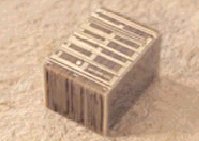

Irvine Sensors Corporation (Nasdaq: IRSN) announced today that it has received an approximate $1 million research and development contract to demonstrate a superconducting digital router for high-speed communications. Under the contract, Irvine Sensors plans to exploit TRW's superconducting high speed switching technology to develop a ``super switch'' that could evolve with the communications industry's ever-increasing need for speed. The initial demonstration goal of the R&D contract is a 256 x 256 switch that can operate at a minimum of 10 Gigabits per second per channel and that can reconfigure in less than a nanosecond. If the full goals of the contract are met, this capability will be extended to a 4,096 x 4,096 switch with at least 40 Gigabits per second per channel. Irvine Sensors is in the process of organizing a consortium of potential industry users to assist in defining potential product requirements and benchmarking the planned switch's performance. ``Conventional technology cannot handle the scalability requirements needed to support the ever increasing need for faster and faster data transmission rates,'' said Dr. Volkan Ozguz, Irvine Sensors' Manager of Technology R&D. ``TRW's superconducting technology addresses the power issues typically associated with high speed switches, while Irvine Sensors' chip-stacking enables the necessary electronics to be compressed into a space comparable to the size of an incoming fiber optics data cable.''
Recent studies estimate that data traffic on the Internet alone is now doubling every [6 months]. Competing Silicon Germanium and Gallium Arsenide technologies are already having a hard time keeping up and are very size and power intensive,'' Berger said. ``Stacked superconducting electronics may be a means to overcome these limitations and enable continued rapid growth of Internet and telecommunications traffic.''
![]()
UPDATE: On October 11, 2000, Irvine Sensors announced the
creation of a subsidiary called iNetWorks Corporation, to commercialize
this technology in applications such as high-speed telecommunications and Internet
routers. iNetWorks plans to release a router product that should be able to
compress the equivalent of eight "state-of-the-art", seven feet-high router bays
into a single bay.
UPDATE: As of April 2003, Irvine Sensors Corporation reports
"The product [has been] completely designed and most components (sub modules)
demonstrated. We have demonstrated stacked Nb and NbN components within the
scope of the SuperRouter development." However, "the market need for the
SuperRouter [has been moved back] to about 2007-2008 timeframe."
![]()
 BACK to the "Uses" page at Superconductors.ORG
BACK to the "Uses" page at Superconductors.ORG
 BACK to the "News" page at Superconductors.ORG
BACK to the "News" page at Superconductors.ORG